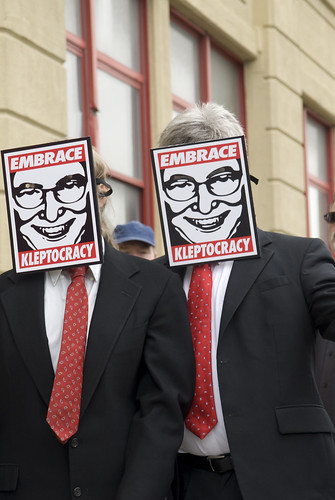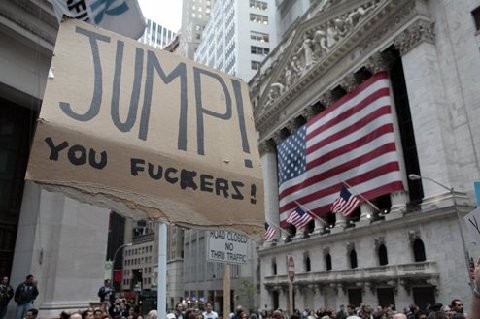Edward at Credit Writedowns had some interesting comments on the earlier post by Jesse at the Le Cafe.
Deregulation as crony capitalism
 Courtesy of Edward Harrison at Credit Writedowns
Courtesy of Edward Harrison at Credit Writedowns
Jesse of Jesse’s Café Américain posted on the important subject of deregulation in his last post, “Why the Austrian, Keynesian, Marxist, Monetarist, and Neo-Liberal Economists Are All Wrong.” In it, he opined that it is entirely wrong-headed to assume everything will be alright if we just let free markets work their magic. I want to take his thoughts one step further because I think there is a misperception about what the free market entails and why the deregulation movement went astray.
Kleptocracy defined
First, a framework.
Last March, I posted an article called “A populist interpretation of the latest Boom-Bust cycle” in which I used Jared’ Diamond’s viewpoint of stratified societies as Kleptocracies as a lens through which to understand the secular trends which have characterized the last generation of western economic history.
The corollary of this – and where I want to concentrate – is that advanced societies are not egalitarian. Some will de facto have more, and others will have less. Moreover, as Diamond asserts, this lack of equality becomes, in essence, a kleptocracy i.e. a reverse Robin Hood organization where the elites enrich themselves at the expense of the others.
This has been the reality in all advanced societies based on agriculture, manufacturing and services for the last 10,000-odd years. This social structure has been net beneficial to the societies employing it in comparison to more simple societies – a case of a rising tide lifting all boats. So, on some level, kleptocracy is nothing about which to get irate.
 The problem is that not all kleptocracies are created equal. At some point, the ruling class overreaches in a way that subtracts from rather than adds to the overall prosperity of the society. Cries of “throw the bums out” are heard, an uprising ensues and a new elite is installed who themselves turn to the same methods of kleptocracy to ensure their own power.
The problem is that not all kleptocracies are created equal. At some point, the ruling class overreaches in a way that subtracts from rather than adds to the overall prosperity of the society. Cries of “throw the bums out” are heard, an uprising ensues and a new elite is installed who themselves turn to the same methods of kleptocracy to ensure their own power.
I suggest you read my ‘populist’ post or Diamond’s book in full for more on this. His book is quite enlightening.
Where free market ideology fits in
Obviously, if some always have more power and wealth than others, there is never a situation in which the economic playing field is level. Moreover, it is axiomatic that those with the means and access will always have greater influence over government than those without. So, in a very real sense, the socioeconomic elite of any advanced, stratified society will always have disproportionate control of the economic and political system.
Now, I happen to be a Libertarian-minded individual, so I have nothing against the free markets, free market ideology, or the concept of small government and deregulation. Freer markets and smaller government are my preferred ideal. However, I am a realist. I understand that markets are never truly free and government fulfills a necessary function.
So, when you here someone talking about getting government out of the way and allowing the free markets to work, you should be thinking about the influence and control this would naturally engender.
 Think crony capitalism
Think crony capitalism
In fact, I would argue that the deregulation and free market capitalism that these individuals refer to is really crony capitalism in disguise. I will explain.
When I think of deregulation, I think of two related but distinct concepts. The one is the actual de-regulation, which is the permission of economic actors to compete in markets previously unavailable to them by order of legislation or de facto government intervention and coercion. The other is regulatory oversight, which is the maintenance of specific rules of engagement under threat of penalty on economic actors by government. De-regulation and regulatory oversight are related concepts but they are not the same.
I am a proponent of deregulation – a major reason I don’t see the re-imposition of the Glass-Steagall Act as the solution to what ails us. When you look across industries that have been deregulated, from energy to transportation to finance, invariably competition has increased and prices have come down, benefitting consumers. That is what deregulation is supposed to do.
On the other hand, whenever you have witnessed lax regulatory oversight after deregulation, it has always been an unmitigated disaster (examples include finance in Sweden, the US and the UK, air travel in the US, energy markets in the US). De-regulation and lax oversight make for a particularly potent cocktail. It’s like allowing your twenty-year old and his friends to drink beer at home under your supervision, but then telling him he can raid the liquor cabinet and going away for a week-long vacation. What do you think is going to happen?
But, if you mix a lack of oversight with deregulation knowing that the political and economic playing field is not even, you are inviting corruption aka crony capitalism. Why do you think the Washington Post was trying to sell access to politicians on health care reform? Why was Lloyd Blankfein the only CEO in the room when AIG’s fate was being decided? Why did the Obama Administration make a secret deal with the pharmaceutical lobby on health care? You might answer that these examples show isolated cases of crony capitalism in an age of special interests. I would argue that you are just seeing the kleptocracy pendulum swing too far. This type of cozy relationship between government and industry has always existed. This is the reason a codified and robust structure for regulatory oversight exists – to prevent this type of thing from tilting the playing field too far.
So, if you want to boil this post down into a sound bite, think: deregulation good, but regulatory oversight necessary. Without the necessary check on the power of special interests that adequate regulatory oversight provides, deregulation is simply another word for crony capitalism.


